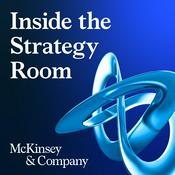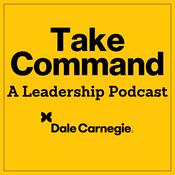572 episódios
- How CX Leaders Can Navigate the Turbulence of an AI-Transformed World
Shep interviews Scott McKain, award-winning speaker and best-selling author. He talks about his latest book, Beyond Distinction: How Leaders Transcend the Turbulence of an AI-Transformed World, and how leaders and organizations can create meaningful, distinctive customer experiences in an AI-transformed world.
This episode of Amazing Business Radio with Shep Hyken answers the following questions and more:
Why is consistency important in providing an excellent customer experience?
What role does emotional connection play in building customer loyalty?
How should companies leverage technology to improve customer service without losing the human touch?
What are some effective ways to deliver a proactive customer experience?
Why is standing out from competitors not enough to build lasting customer relationships?
Top Takeaways:
Standing out from competitors is important. However, simply being different is not always good. Distinction is when what we do is unique, compelling, and memorable in a way that is impactful and meaningful to the customers we seek to serve.
Consistency wows customers. Amazing customer experiences are built on doing small things right, every time. When every interaction is handled with care and attention, customers learn to trust the brand.
Technology, like AI, can make your business faster and more efficient, but loyalty comes from how you make customers feel. Even with simple gestures like remembering someone's name or checking whether the customer got everything they need, it's the human touch that keeps people coming back.
Use AI to save money and handle repetitive tasks efficiently, giving your team more time to focus on resolving customer issues and building stronger relationships.
Every organization should be very precise about what they aren't, just as clear as they are about what they are.
Real competitive advantage does not come from reacting to trends or to what your competitors are doing. If you are constantly in reaction mode, you are already behind. Staying ahead means anticipating your customers' needs before they realize what they want.
Artificial Intelligence amplifies the values and habits a business already has, good or bad. If a business is committed to consistently providing excellent service, AI will help them do so even better. If a business is running on broken systems or is only focused on cutting costs, AI could make those problems worse.
Plus, Scott shares more insights from his latest book, Beyond Distinction: How Leaders Transcend the Turbulence of an AI-Transformed World. Tune in!
Quote:
"Tasks go to technology, but emotion and customers go to human beings."
About:
Scott McKain is a Hall of Fame speaker, business advisor, and the founder/CEO of the Distinction Institute. He is the best-selling author of ALL Business is STILL Show Business, Iconic, Create Distinction, and his latest, Beyond Distinction.
Shep Hyken is a customer service and experience expert, New York Times bestselling author, award-winning keynote speaker, and host of Amazing Business Radio.
Learn more about your ad choices. Visit megaphone.fm/adchoices - Turning Customer Experience into Customer Transformation
Shep interviews Joseph Pine, best-selling author of Experience Economy, speaker, and cofounder of Strategic Horizons LLP. He talks about his new book, The Transformation Economy, and how businesses can go beyond creating memorable experiences to guiding customers through meaningful transformations that help them achieve their aspirations.
This episode of Amazing Business Radio with Shep Hyken answers the following questions and more:
What is the transformation economy?
What is the difference between selling a product and creating a transformative customer experience?
How can businesses guide customers to achieve their personal or professional aspirations?
What are the benefits of customizing experiences to meet individual customer needs?
What elements contribute to a robust customer experience?
Top Takeaways:
The transformation economy is about how companies can help customers change. It is about how your business can help them achieve their aspirations.
Businesses create more value when they focus on selling the end rather than the means. Go beyond selling products and services to understanding why customers buy and use that knowledge to help them reach their goals and achieve their aspirations.
Transformation is not a one-size-fits-all. It must begin with truly understanding where the customer is starting (from) and where your customers aspire to end up (to). Carefully identify the customer’s current situation, needs, and aspirations to tailor experiences that produce meaningful outcomes for them.
Sell transformation, not just products. For example, people don't buy a treadmill because they want the equipment. They want to be healthier, have more stamina, or feel better about themselves. Whether you’re selling a physical product, a service, or something else, shift your mindset to the customer’s desired result.
In both B2B and B2C, businesses should become trusted partners, not just vendors. That means understanding clients’ deeper goals and helping them achieve success, even if it occasionally means recommending solutions outside what you sell. The focus is on the customer's outcome, not just the transaction.
In the transformation economy, companies should charge for what customers value most: outcomes. Companies are moving away from pricing based on time, materials, or products. It is focused on results.
Transformative change for customers doesn't come from a single transaction. It spans the entire journey, including the preparation before the event, reflection afterwards, and ongoing integration into daily life.
Plus, Shep and Joe share insights from The Transformation Economy and discuss companies that are putting customer transformations first. Tune in!
Quote:
"Transformations are built on top of experiences. We change through the experiences that we have. "
About:
Joseph Pine is a bestselling author, speaker, and cofounder of Strategic Horizons LLP, celebrated for guiding Fortune 500 companies and innovative startups alike. He is the author of The Experience Economy, Mass Customization, and Infinite Possibility.
Shep Hyken is a customer service and experience expert, New York Times bestselling author, award-winning keynote speaker, and host of Amazing Business Radio.
Learn more about your ad choices. Visit megaphone.fm/adchoices - Closing the CX Gap with the Help of Artificial Intelligence
Shep interviews Michele Carlson, Director of Product Marketing & Head of Content Strategy at NiCE. They discuss the top AI trends shaping customer experience and transforming contact centers. This is based on Michele and Shep’s recent webinar that featured 10 trends. CLICK HERE to enjoy the full webinar.
This episode of Amazing Business Radio with Shep Hyken answers the following questions and more:
What does "AI first" mean in customer experience?
How can businesses maintain a human-centric approach while integrating artificial intelligence in customer service?
How does AI help streamline workflows for customer service agents?
Why is it important for companies to keep humans involved in designing AI systems?
How can agentic AI improve customer interactions and resolve issues more efficiently?
Top Takeaways:
AI has advanced to the point where we can use it to take actions and complete workflows. It not only understands what customers say and provides answers, but it can also complete tasks like sending a package or updating an account.
Shep and Michele share five AI trends that shape the future of customer experience and contact centers.
Trend #1: AI first, but it doesn't mean AI only. Companies use AI to get quick answers or to resolve issues quickly. But this doesn't mean eliminating human customer support. It means that when things get too complicated or tricky for AI to handle, human agents can step in to make sure the experience is personalized and complete.
Trend #2: Human-Centric AI. 72% of customers say that they've experienced AI and automation benefits. Technology must be designed with humans at its center to truly understand and address human needs while empowering both customers and agents.
Trend #3: Agentic AI. Agentic means artificial intelligence that can use language to take action autonomously. To put it simply, the system can take the customer's data, determine what needs to be done, and complete the task without human intervention, allowing humans (employees) to focus on more important and complex issues.
Trend #4: Experience Memory. AI can help companies not just remember who their customers are, but also their problems, preferences, and relevant details of past interactions.
Trend #5: AI Observability. Don't invest in something you can't measure. Success isn't just about using as much new technology as possible. It is about seeing real results like smoother processes, happy employees, and satisfied customers.
LAMs, or Language Action Models, help AI move beyond data analysis. They interpret the language, determine the intent, and act accordingly. They streamline agents’ workflows by automating repetitive tasks and integrating multiple systems, so agents spend less time juggling multiple tabs and focus more on interacting with customers.
There is a 40% gap between what companies think their service is like and how customers actually feel about the experience. Companies need to listen to their customers, get real feedback, and invest in people and technologies to close the gap.
Plus, Michele discusses more stats on AI-powered experiences that can help you enhance customer satisfaction and streamline business operations. Tune in!
Quote:
"When we say AI first, we don’t mean AI only. It means you start with artificial intelligence to help resolve customer issues, but it’s not the only solution."
About:
Michele Carlson, Director of Product Marketing & Head of Content Strategy at NiCE. She is an expert in AI-powered analytics and customer experience, transforming contact centers and delivering customer-centric results.
Shep Hyken is a customer service and experience expert, New York Times bestselling author, award-winning keynote speaker, and host of Amazing Business Radio.
Learn more about your ad choices. Visit megaphone.fm/adchoices - Shep Hyken’s Latest Research and Insights on Customer Service and Experience
Shep discusses the five most important trends and predictions for 2026, what you should stop doing to create a better customer service experience, and a sneak peek at the findings from his latest customer service and experience research.
This episode of Amazing Business Radio with Shep Hyken answers the following questions and more:
What are the top customer service trends that leaders can expect to see in 2026?
Why is it important for businesses to provide both AI-powered self-service options and live customer support?
How can companies build and maintain trust with their customers?
How can frontline employees be a valuable source of insight for customer experience improvements?
Why is ongoing customer service training important for employees, even after onboarding?
Top Takeaways:
Trust is the foundation of customer relationships. When customers don't believe that a business will keep its promises, they will move on to a brand that will. When a brand provides honest communication and consistent follow-through, they build confidence with its customers.
Personalized service is an expectation. Customers expect businesses to know who they are and remember their history, whether it’s past purchases or previous conversations. When you use data to improve your customers' experience, like recommending better products or sending relevant messages, they feel treated as individuals rather than just transactions.
AI is becoming a normal part of customer service. Most customers expect self-service options to handle simple requests and get simple answers. But this doesn't mean that human agents are becoming obsolete. Customers still want to speak to live agents, especially when dealing with complicated or emotional issues. This is why companies need to encourage customers to use self-service tools while letting them know that they are welcome to call when they need to.
Companies should map out employee journeys just as they do with customers. Find what’s frustrating, and make work smoother and easier. When employees are treated with care and respect and provided with the tools and training they need, they are more likely to create happy customers.
Training should not be limited to onboarding. It should be an ongoing process to keep customer service skills sharp and expand their capabilities. It can take the form of short reminders, weekly huddles, or sharing moments of magic with customers.
Consistency is more important than "wow" moments. Trying to go over the top every time isn’t realistic or necessary. Predictable, reliable experiences are what makes customers feel safe and valued. When customers know what to expect, it builds their confidence and makes them want to come back.
When a customer has a complaint or problem, it’s not enough to just fix the issue. The goal is to restore confidence and make the customer want to do business with you again. Meet with your team, and ask why the problem happened. Then, find ways to prevent it in the future. Solve for the customer's feelings, not just the complaint itself.
Plus, Shep shares interesting stats from his latest customer service and experience research. What is more important to customers, service or price? What makes them trust a business more? What makes them come back again and again? Tune in!
Quote:
"Customers continue to be smarter than ever and with higher expectations about the experience that they receive from companies they do business with."
About:
Shep Hyken is a customer service and experience expert, New York Times bestselling author, award-winning keynote speaker, and host of Amazing Business Radio.
Learn more about your ad choices. Visit megaphone.fm/adchoices - Why Customer Experience Is Your Hidden Profit Center
Shep interviews Ty Givens, Founder of CX Collective. She talks about how contact centers can be transformed into growth engines by proactively addressing customer needs and empowering employees through training.
This episode of Amazing Business Radio with Shep Hyken answers the following questions and more:
How can frontline customer service representatives be empowered to act as the face of a brand?
How does training impact the effectiveness and efficiency of customer support teams?
What are the main benefits of proactive customer experience versus reactive customer service?
How can technology, such as AI, improve resolution times for common customer issues?
How can businesses educate customers to use digital support channels for faster issue resolution?
Top Takeaways:
Every employee interacting with a customer becomes the face of the company. Train employees on their role to represent and support the brand. When someone calls with a problem, regardless of who is at fault, it is their responsibility to make things right and create a positive experience for the customer.
When you start using customer service as a listening tool, it stops being a cost and becomes a way to improve processes for employees and experiences for customers.
Feedback can be silent. Pay attention to what your customers are saying and what they are not saying. Sometimes, customers hint at underlying problems without saying it. Picking up on context and clues can help solve issues faster and even improve services in the future.
Customer service becomes proactive by paying attention to feedback and patterns that allow you can fix issues before the next customer gets upset. Pay attention to what features or products your customers love to use. Identify the features customers don't interact with so you can either improve them or focus your resources elsewhere.
A simple mistake, such as leaving an item out of an order, can lead to angry calls, extra costs to fix the problem, and even lost customers. Training employees to understand how their actions affect the entire customer journey helps reduce errors. Even small improvements can save costs and keep customers and employees happier.
Investing in your employees expands their capabilities in helping customers. Even thirty minutes spent learning a new skill or understanding a customer’s needs, once every month or two, can save time and money in the long run.
Plus, Shep and Ty discuss more ways a call center can drive growth and revenue. Tune in!
Quote:
"In most companies, the customer service team is the only function that has direct, one-to-one conversations with customers. This makes them a powerful source of insight, not just from what customers say, but from what they don’t say. Teach your team to actively listen, read between the lines, and recognize opportunities to improve the customer experience."
About:
Ty Givens is the founder of CX Collective. She helps leaders turn inefficient processes into reliable, human-centered systems that boost team productivity and customer loyalty.
Shep Hyken is a customer service and experience expert, New York Times bestselling author, award-winning keynote speaker, and host of Amazing Business Radio.
Learn more about your ad choices. Visit megaphone.fm/adchoices
Mais podcasts de Negócios
Podcasts em tendência em Negócios
Sobre Amazing Business Radio
Amazing Business Radio features customer service expert and New York Times bestselling author Shep Hyken who interviews leading business professionals and other customer experience experts. Each guest shares tips and insights on how to succeed in business. The bright business minds featured on Amazing Business Radio come from all over the world and include viral video stars, corporate CEOs, bestselling authors, thought leaders, and many other inspiring personalities. The show covers a variety of topics related to customer service and customer experience and will provide answers that listeners need to know in order to take their success to the next level. Amazing Business Radio airs every week on, itunes, Soundcloud, and other platforms and channels.
Site de podcastOuça Amazing Business Radio, Braincast e muitos outros podcasts de todo o mundo com o aplicativo o radio.net

Obtenha o aplicativo gratuito radio.net
- Guardar rádios e podcasts favoritos
- Transmissão via Wi-Fi ou Bluetooth
- Carplay & Android Audo compatìvel
- E ainda mais funções
Obtenha o aplicativo gratuito radio.net
- Guardar rádios e podcasts favoritos
- Transmissão via Wi-Fi ou Bluetooth
- Carplay & Android Audo compatìvel
- E ainda mais funções


Amazing Business Radio
Leia o código,
baixe o aplicativo,
ouça.
baixe o aplicativo,
ouça.








































